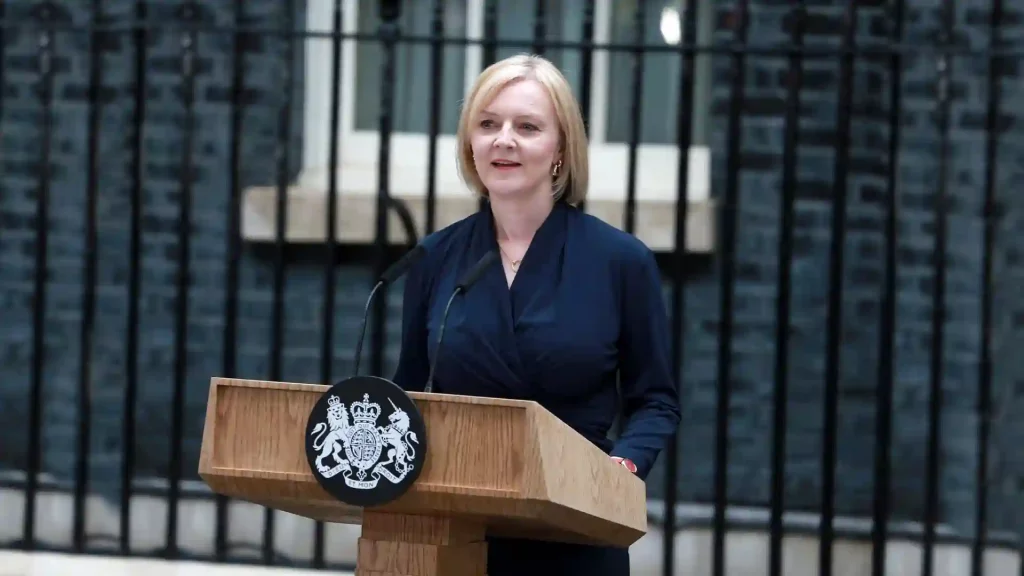The resignation of the Prime Minister causes a second Tory leadership election in four months
Liz Truss resigns after turmoil in the cabinet marked by widespread opposition following the former chancellor Kwasi Kwarteng’s announcement of the ‘mini-budget’ in the month of September 2022. The decision by Liz Truss to resign causes a second Tory leadership election in four months. Ms. Truss came into power in early September with a promise of a maximum push for the growth of the economy.
The UK PM’s decision to cut taxes as well as significant measures that were taken to provide financial support to restrict commercial and domestic energy prices all lead to a substantial fall in the value of sterling against US dollars and other major currencies. The value of Gilts, the bonds issued by the UK government also fell as a market reaction to the elimination of the additional rate of income tax and also increased concerns on how the suggested tax cuts and energy price capping would be funded.
Economy under Liz Truss
The six-week tenure of Liz Truss was marked by controversial economic plans that left the UK economy in crisis followed by a series of decisions taken to cut taxes and cap energy prices. Truss came into power on September 2022, a time when the economy was battling recession, cost of living crisis, and inflation. Truss promised an era of growth by tackling the UK’s cost of living crisis and coming up with a plan that would secure the fuel supplies and control the increase in energy bills.
The PM headed her electoral campaign, confronting the typical economic policies and abandoning tax increases, and reducing other charges which can have an effect on increasing inflation. On September 23, 2022, the world saw the announcement of a ‘mini-budget’ by ex-chancellor Kwasi Kwarteng addressing three key issues that include an energy market finance scheme, equal support for business, and an energy price guarantee. The budget introduced, brought the basic rate of the income tax cut down to 19% from the earlier 20%.
Kwarteng also announced the 45% additional rate income tax band for people earning more than £150,000 will be canceled entirely. The tax cuts are said to be the biggest ones in half a century. The rate of inflation shot up to 10.1%, a 40-year high in September amongst firing food and energy prices which directly deepened the cost-of-living crisis in the UK. The inflation rate was above the Bank of England’s 2% target, with the central bank’s prediction of reaching as high as 11% in the month of October.
The announcement of the budget also had market reactions as two-year gilt yields rose by 50 basis points, to a high of 3.997% which was the biggest one-day rout since 2009 while sterling fell 1.9% on the day to around $1.1047, the lowest value in 37 years.
The mini-budget introduced to improve the economic condition however, took a downward spiral and had opposite effects from its intention. The British pound hit a record low against US dollars and other major currencies on September 26 as the budget produced an enormous reaction on the markets causing investors to retreat following a sharp rise in the cost of government borrowing.
It also had an impact on UK pension funds. The Bank of England had to intervene to safeguard the pension sector with a support system worth £65bn. Truss defended her decisions taken in the budget and stated it was necessary to keep the economy growing. The falling pound caused to increase in the cost-of-living crisis by 0.5% points in the coming year. On September 26, the pound plunged reaching $1.04, which is the lowest ever against the US dollar.
On October 3, Kwarteng reversed plans to cut the country’s highest rate of income tax making up around two billion pounds ($2.2bn) of the overall 45 billion pounds ($50.4bn) tax-cutting plan followed by the sacking of Kwasi Kwarteng by Liz Truss on October 14. The new chancellor Jeremy Hunt announced that most of the tax measures adopted by the mini-budget are reversed.
Effect of Liz Truss’s resignation on Markets
Liz Truss’s resignation announcement on Thursday seemed to cheer the market up as the pound value shot up against the dollar and the government borrowing costs reduce as the markets. Sterling hits $1.13 as Liz Truss resignation announcement came in and continue to rise before falling back to $1.12. The interest rates on yield rose above 4% on Thursday and fell back steadily as the assumptions grew on Liz Truss’s resignation. The yield rose to 3.8% after the resignation announcement
Who will be the the successor?
“We’ve agreed that there will be leadership election to be completed within the next week”. Liz Truss during her resignation speech mentions the selection of a new Prime Minister within a week and will remain as the caretaker Prime Minister till successor is elected. Graham Brady the conservative official responsible for the process mentioned that the next candidates will require at least 100 nominations from the party’s MP’s by 2pm on Monday.
If only one candidate gets the nominations, they will be automatically selected as the next Prime Minster, otherwise an online ballot of party members will close on October 28. Speculations are already in place regarding ‘Who it might be?’ and cards are calling two names in the forefront: Boris Johnson, former Prime Minister and Rishi Sunak. Penny Mordaunt, Ben Wallace and Jeremy Hunt are the other names coming upfront. The successor however, regardless of who it might be, have to unwind the damage caused to economy and bring it back on track
